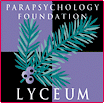 |
 |
| Click here for the PF Lyceum Site Index
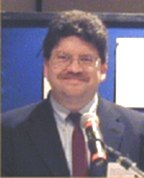 Charles Richet’s (1850-1935) Work in Psychical Research PF Lyceum Blog #26 Posted September 25th, 2008 Carlos S. Alvarado, Ph.D. email: alvarado@parapsychology.org 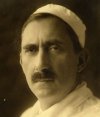
Whenever there is a conversation about past eminent scientists interested in psychical research the name of Charles Richet is usually mentioned (his photograph appears in the left). His scientific biography, in the field of physiology, is impressive. (For an overview click here). A professor at the University of Paris between 1887 to 1926, Richet was granted the Nobel Prize in 1913 for his work in anaphylaxis. He was also known for his research on gastric juice, muscle function, serum therapy, and thermoregulation. 
A man of boundless interests, Richet’s work was not limited to physiology. Under the name of Charles Epheyre he wrote poetry and plays. His play Circé was first presented with Sarah Bernhardt in the leading role (Wolf, 1993, p. xviii). (A photograph of Sarah Bernhardt is to the right.) He also worked in aviation, and published on varied topics such as history, philosophy, sociology, and world peace. Regarding psychology, his work included discussions about the nervous system, reflex movements, instinct, consciousness, memory, and will (Richet, 1898), as well as empirical investigations on the induction of changes of personality in hypnotized individuals (Richet, 1883). This, and other writings about hypnosis, were compiled in his book L’homme et l’intelligence (Richet, 1884a). 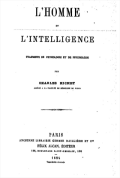
Psychical research, which Richet called “metapsychics” from 1905 on (e.g., Richet, 1905, 1923b), interested him immensely. (For more information, click here) In fact, in his 1933 autobiography Souvenirs d’un physiologiste, he stated that he had cultivated it with “ardor,” and that he was “convinced that it is the science of the future” (Richet, 1933, p. 146). By Richet’s own account his first observation of a psychic phenomenon took place in 1872 when he was a medical student. This was an instance of lucidity in a young woman he had hypnotized. When he asked her to “read” the name of another young medical student present at the time that she did not know, she stated: “There are five letters. The first is H, the second if E; I cannot see the third … The fourth … is R; and the fifth N” (Richet, n.d., p. 68). The friend’s name was Hearn. Richet also reported in later years some personal veridical impressions. 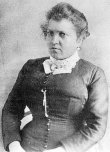
In the 1880s Richet became involved in the study of mental suggestion, and he went to Milan in 1892 to see the phenomena produced by Italian medium Eusapia Palladino. (Her photograph is to the right.) 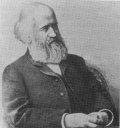 His interests in psychic phenomena put him in contact with many other psychical researchers such as Alexander Aksakof pictured on the left), Cesare Lombroso, and Frederic W. H. Myers, among many others. His interests in psychic phenomena put him in contact with many other psychical researchers such as Alexander Aksakof pictured on the left), Cesare Lombroso, and Frederic W. H. Myers, among many others.
His work, and contacts with members of the Society for Psychical Research (SPR) brought him the presidency of the Society, the first time this honor was conferred to a Frenchman. In his SPR Presidential Address, delivered on February 6, 1905, Richet distinguished two metapsychics, a subjective one concerned with the acquisition of knowledge, and an objective one about physical phenomena (Richet, 1905). The first included telepathy and clairvoyance, while the second included telekinesis and materializations. This address, typical of other writings by Richet, included thoughts about the necessity for further research, particularly in a field like metapsychics “where everything is unknown” (p. 28). Metapsychic phenomena, he believed, showed intelligence. As he wrote “the forces that govern presentiments, telepathy, movements of objects without contact, apparitions, and certain mechanical and luminous phenomena do not seem to be blind and unconscious forces … They appear to have intellectuality, will, and intention, which may not be human, but which resemble human will and intention. Intellectuality—the power of choice, intention, and decision conformably to a personal will—characterizes all metapsychic phenomena” (Richet, 1923, p. 4-5). Richet’s metapsychic career included many contributions. In addition to having had test séances with mediums such as the above mentioned Eusapia Palladino, he sat as well as with Leonora E. Piper, Marthe Béraud, and Franek Kluski. (For an essay on mediums written by Richet click here.) 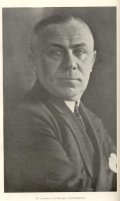
He also tested gifted persons such as Léonie Leboulanger, and Stefan Ossowiecki, pictured to the right), and less well known individuals he referred to as Alice, Eugénie, and Helena (Richet, 1888b, n.d.). 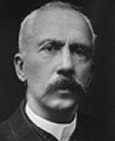
Richet (pictured to the left in mid-career) also used his scientific and social prestige to open doors for psychical research. He helped the cause of psychical research by openly discussing the topic in publications such as the Revue philosophique de la France et de l’étrangere (Richet, 1884b, 1888a), in presentations at the Société de Psychologie Physiologique, as well as through founding the Annales des sciences psychiques, the first issue of which was published in 1891.. (For more information on this see p. 67 in an article by myself and my colleagues at this link.) According to philosopher and SPR President Henry Sidgwick, Richet, who was the Secretary of the International Congress of Physiological Psychology held in 1889, was responsible in getting the SPR involved in the congress through a direct invitation (Sidgwick & Sidgwick, 1906, p. 515). While Richet wrote many papers and books about metapsychics (for a bibliography click here), I will limit my discussion to the following:
Richet’s views of metapsychics were influenced by his physiology. This was evident in his opinions about the evidence for survival of bodily death. In his view, many of the phenomena of the field were at the “borders of physiology itself, but of very uncertain physiology” (Richet, 1905, p. 31). Cryptesthesia, he believed, was “a new chapter in physiology” (Richet, 1923a, p. 496), and the phenomena of Palladino were described as belonging to the “domain of experimental physiology” (Richet, 1932, p. 154). Richet made many important contributions to psychical research, not the least of which was popularizing and publicizing the field at a high level, and reminding other scientists of the importance of the research. His work in the field since the nineteenth-century was a reminder of the lacunas of scientific knowledge and the complexity of human beings. It was also a reminder of the courage some individuals have shown to stand against so much hostility to state their belief that there is good evidence for psychic phenomena, a topic Richet (1884b) mentioned at the end of his first classic paper. Richet, C. (1905). La métapsychique. Proceedings of the Society for Psychical Research, 19, 2–49. Richet, C. (1883). La personnalité et la memoire dans le somnambulisme. Revue philosophique de la France et de l’étranger, 15, 225–242. Richet, C. (1884a). L’homme et l'intelligence: Fragments de physiologie et de psychologie. Paris: Félix Alcan. Richet, C. (1884b). La suggestion mentale et le calcul des probabilités. Revue philosophique de la France et de l’étrangere, 18, 609–674. Richet, C. (1888a). Expériences sur le sommeil a distance. Revue philosophique de la France et de l’étrangere, 25, 435–452. Richet, C. (1888b). Relation de diverses expériences sur la transmission mentale, la lucidité, et autres phénomènes non explicables par les données scientifiques actuelles. Proceedings of the Society for Psychical Research, 5, 18–168. Richet, C. (1898). Essai de psychologie générale (3rd ed.). Paris: Félix Alcan. Richet, C. (1923a). Extra-sensorial channels of knowledge and the experimental method. Lancet, 2, 493–497. Richet, C. (1923b). Thirty Years of Psychical Research. New York: Macmillan. (Translated from the second French edition of Traité de métapsychique) Richet, C. (nd, ca 1929). Our Sixth Sense. London: Rider. (First published in French, 1928) Richet, C. (1932). Autobiographie. Les biographies médicales, 6, 145–160. Richet, C. (1933). Souvenirs d’un physiologiste. Paris: J. Peyronnet. Sidgwick, A., & Sidgwick, E.M. (1906). Henry Sidgwick: A Memoir. London: Macmillan. Wolf, S. (1993). Brain, Mind and Medicine: Charles Richet and the Origins of Physiological Psychology. New Brunswick: Transaction Publishers. ***************** |
 |

|
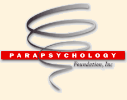 www. parapsychology. org |
||